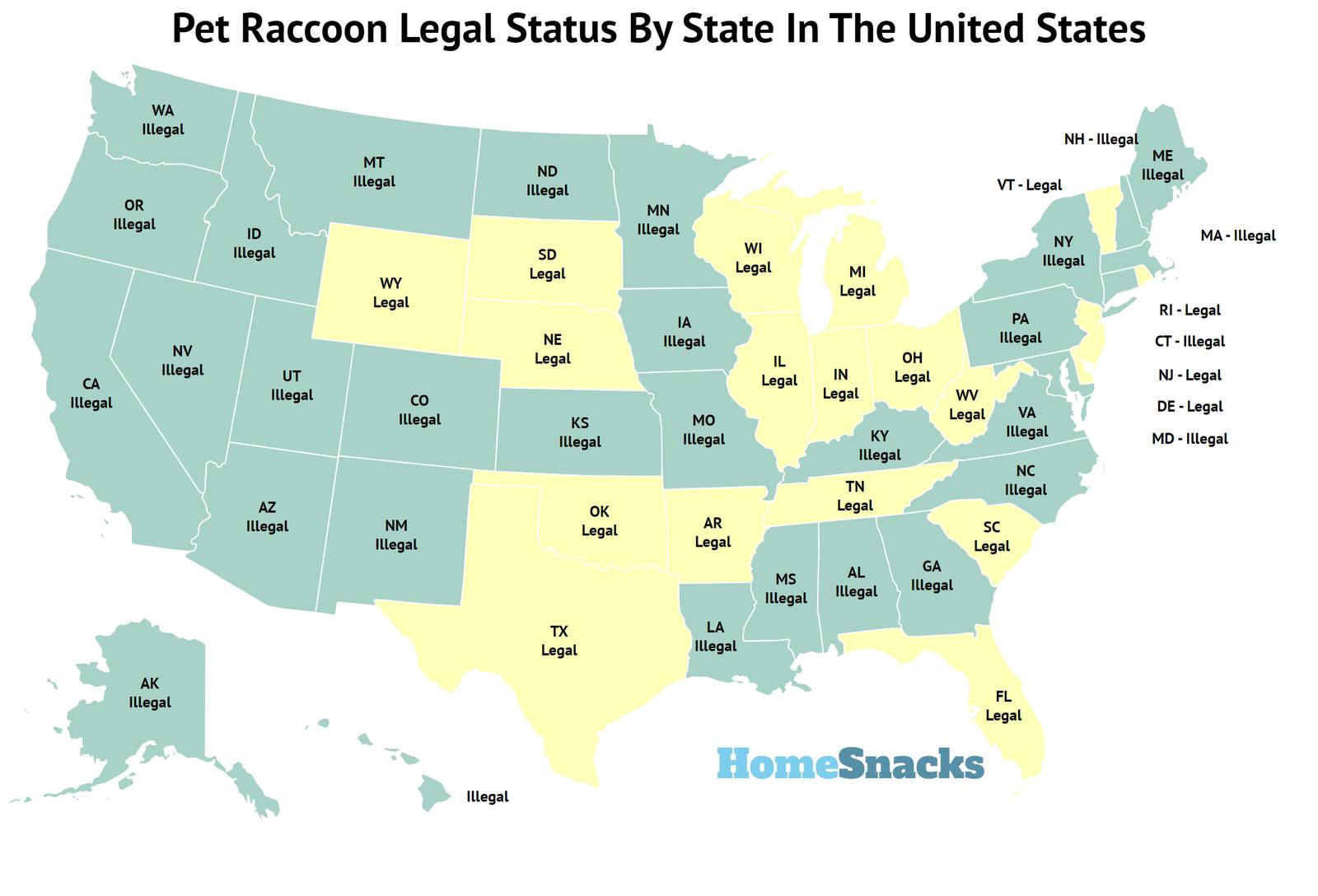Pet raccoon laws research summary. We researched the legality of raccoons as pets across the United States. After we reviewed every state, like a raccoon foraging for food, we found the following.
-
Raccoons are legal pets in 19 states, including Oklahoma, Florida, and Ohio.
-
Raccoons are not legal pets in 31 states like California, Oregon, and New York.
Map Of Where Raccoons Are Legal Pets In The US
The map shows that the upper Midwest is partial to having raccoons as pets. A cluster of states that includes Indiana, Michigan, and Illinois all allow pet raccoons. Additionally, more traditional individual rights states like Texas and Oklahoma also have legal raccoons.
It’s important to note that while some states in the Midwest might permit raccoon ownership, there are often regulations and requirements to ensure the safety and welfare of the animals and the community. These regulations include obtaining permits, meeting specific enclosure standards, and adhering to health and safety guidelines.
States Where A Pet Raccoon Is Legal
Historically, raccoons were commonly kept as pets by Native American tribes and early settlers in the area. This cultural acceptance and the relatively abundant population of raccoons in the Midwest and Oklahoma might have contributed to a more lenient attitude toward keeping them as pets.
- Arkansas – Legal
- Delaware – Legal
- Florida – Legal
- Illinois – Legal
- Indiana – Legal
- Michigan – Legal
- Nebraska – Legal
- New Jersey – Legal
- Ohio – Legal
- Oklahoma – Legal
States Where A Pet Raccoon Is Illegal
Raccoons are typically not allowed as pets in much of the Northeastern region due to concerns over disease transmission, potential environmental disruption, behavioral challenges, and the need for wildlife protection.
- Alabama – Illegal
- Alaska – Illegal
- Arizona – Illegal
- California – Illegal
- Colorado – Illegal
- Connecticut – Illegal
- Georgia – Illegal
- Hawaii – Illegal
- Idaho – Illegal
- Iowa – Illegal
Pet Raccoon Laws By State
| State | Pet Raccoon Legal Status | Permit? |
|---|---|---|
| Arkansas | Legal | No |
| Delaware | Legal | Yes |
| Florida | Legal | Yes |
| Illinois | Legal | Yes |
| Indiana | Legal | Yes |
| Michigan | Legal | Yes |
| Nebraska | Legal | Yes |
| New Jersey | Legal | Yes |
| Ohio | Legal | Yes |
| Oklahoma | Legal | Yes |
| Rhode Island | Legal | No |
| South Carolina | Legal | Yes |
| South Dakota | Legal | Yes |
| Tennessee | Legal | Yes |
| Texas | Legal | Yes |
| Vermont | Legal | No |
| West Virginia | Legal | Yes |
| Wisconsin | Legal | Yes |
| Wyoming | Legal | Yes |
| Alabama | Illegal | – |
| Alaska | Illegal | – |
| Arizona | Illegal | – |
| California | Illegal | – |
| Colorado | Illegal | – |
| Connecticut | Illegal | – |
| Georgia | Illegal | – |
| Hawaii | Illegal | – |
| Idaho | Illegal | – |
| Iowa | Illegal | – |
| Kansas | Illegal | – |
| Kentucky | Illegal | – |
| Louisiana | Illegal | – |
| Maine | Illegal | – |
| Maryland | Illegal | – |
| Massachusetts | Illegal | – |
| Minnesota | Illegal | – |
| Mississippi | Illegal | – |
| Missouri | Illegal | – |
| Montana | Illegal | – |
| Nevada | Illegal | – |
| New Hampshire | Illegal | – |
| New Mexico | Illegal | – |
| New York | Illegal | – |
| North Carolina | Illegal | – |
| North Dakota | Illegal | – |
| Oregon | Illegal | – |
| Pennsylvania | Illegal | – |
| Utah | Illegal | – |
| Virginia | Illegal | – |
| Washington | Illegal | – |
Methodology: How We Determined The Pet Raccoon Laws In Each State
To determine the legality of raccoons as pets in various states, we conducted the following analysis:
-
Compilation of State Pet Raccoon Laws. An initial step involved gathering information on raccoon ownership regulations from reliable legal sources, including official state government websites, wildlife departments, and legal databases. This compilation ensured accurate and up-to-date information.
-
Legal Review Of Pet Raccoon Laws: Each state’s specific regulations were carefully reviewed to identify whether raccoons were allowed as pets, restricted under specific conditions, or prohibited outright. Key details, such as permit requirements, enclosure standards, and ownership restrictions, were noted.
-
Mapping Raccoon Laws By State: Finally, we mapped the legal status of pet raccoon ownership in each state.
Note we are not lawyers, and this is not legal advice. Before making a raccoon a pet, please check with local authorities.
Conclusion
The allowance or prohibition of raccoons as pets varies across states due to a complex interplay of cultural history, ecological considerations, public health concerns, and legislative decisions.
States in the Midwest, where raccoon ownership has historical roots and greater familiarity with wildlife exists, may be more lenient.
However, the Northeast’s stricter approach stems from a desire to protect local ecosystems and public health.
Ultimately, the differing approaches reflect the delicate balance between preserving native species, ensuring animal welfare, and safeguarding human well-being, with each region tailoring its stance based on its unique circumstances and priorities.
In my experience, I’d prefer a dog to a raccoon any day.
References
- www.outdooralabama.com
- www.akleg.gov
- apps.azsos.gov
- www.agfc.com
- wildlife.ca.gov
- www.cpr.org
- www.cga.ct.gov
- agriculture.delaware.gov
- myfwc.com
- georgiawildlife.com
- hdoa.hawaii.gov
- idfg.idaho.gov
- www2.illinois.gov
- www.in.gov
- sos.ks.gov
- fw.ky.gov
- www.brla.gov
- www.iowadnr.gov
- www.animallaw.info
- www.mass.gov
- www.michigan.gov
- www.dnr.state.mn.us
- fwp.mt.gov
- outdoornebraska.gov
- www.leg.state.nv.us
- www.animallaw.info
- dep.nj.gov
- www.nmlegis.gov
- portal.311.nyc.gov
- www.ncwildlife.org
- gf.nd.gov
- ohiodnr.gov
- www.wildlifedepartment.com
- oregon.public.law
- dem.ri.gov
- texreg.sos.state.tx.us
- www.wildlifecenter.org
- agr.wa.gov
- dnr.wi.gov

